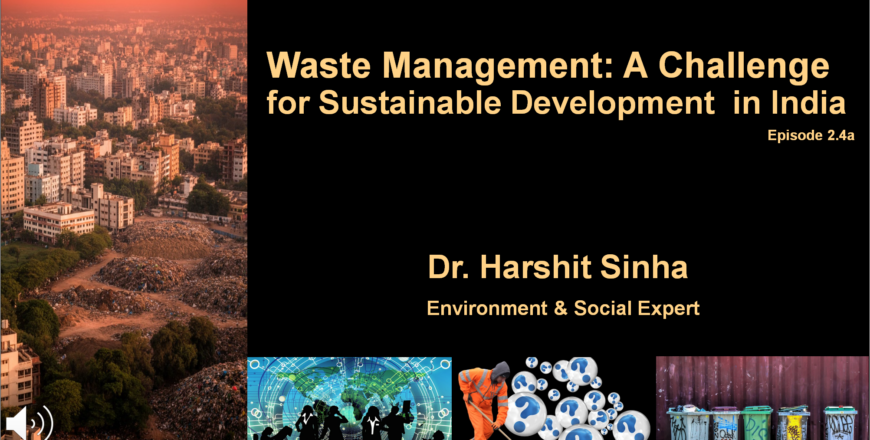Waste Management - A Challenge for Sustainable Development in India
- Description
- Curriculum
- Reviews

-
1Introduction
This lesson explores the importance of waste management in India's sustainable development. With rapid urbanization and a growing population, improper waste disposal poses environmental and health risks, including clogged drains, pollution, and greenhouse gas emissions. By adopting efficient waste segregation, recycling, and disposal methods, India can reduce landfill use, promote a circular economy, and achieve environmental goals, such as those in the Swachh Bharat Mission. Learn about the challenges posed by India's massive waste generation and the critical steps needed to protect public health and the environment.
-
2The Scale of India's Solid Waste Management Challenge
This slide examines India's significant waste management challenges, where annual municipal solid waste generation reaches 62 million tonnes. Of this, only 43 million tonnes are collected, with just 12 million tonnes scientifically processed. Alarmingly, 31 million tonnes end up in landfills or open spaces, leading to environmental degradation, public health risks, and greenhouse gas emissions. With only 28% of collected waste receiving proper treatment, the gap in waste management infrastructure highlights the urgent need for sustainable solutions, particularly in rapidly urbanizing urban centers.
-
3Composition of Municipal Solid Waste in India
India's municipal solid waste consists mainly of organic waste (40-60%), offering potential for composting and bio-energy generation. Recyclables like paper, plastics, metals, and glass account for 20-30%, providing opportunities for resource recovery. Inert materials, such as construction debris and ash, make up 10-20% and require specialized disposal. The remaining 5-10% includes textiles, leather, and e-waste, demanding tailored recycling solutions. This composition highlights the need for integrated waste management strategies to maximize resource recovery and sustainability.
-
4The other Type Wastes Management Challenges
In 2024, India faced diverse waste challenges: generating 9.46 million metric tons of plastic waste, 2 million metric tons of e-waste, 600 metric tons of biomedical waste daily, and 4 million metric tons of hazardous waste annually. Industrial hazardous waste added 7.46 million metric tons from 43,936 industries. Despite these challenges, India processed over 78% of its total waste, thanks to initiatives like solid waste treatment plants and recycling programs, marking significant progress in waste management.
-
5Urban Planning and Waste Management
Efficient waste management in India requires strategic urban planning. Proper land allocation for landfills, recycling centers, and waste-to-energy plants prevents uncontrolled waste spread. Robust infrastructure with bins, compactors, and recycling facilities supports waste collection, while integrated transport systems ensure efficient waste movement. Urban green spaces promote environmental health and sustainable practices like composting. As Indian cities grow, incorporating waste management into urban development plans is essential for organized and sustainable waste disposal.
-
6Waste Management in Rural India
Rural waste management in India emphasizes sustainable, decentralized practices. Composting reduces landfill waste, enriches soil, and cuts methane emissions, while small-scale biogas plants convert organic waste into renewable energy for cooking and lighting. Recycling platforms in village clusters can create jobs and manage materials like plastic and metal effectively. Integrating waste management with sanitation initiatives, such as the Swachh Bharat Mission, enhances rural environments and promotes healthier living conditions.
-
7Urban-Rural Divide in Waste Management
Urban areas generate more waste due to population density and industrial activities, with organized collection systems and better recycling facilities. In contrast, rural areas produce less waste but rely on unorganized systems and face limited access to recycling infrastructure. Urban regions struggle with space constraints, while rural areas face logistical challenges due to dispersed populations. Bridging this divide through urban-rural partnerships and community-based initiatives is key to achieving comprehensive waste management in India.
-
8India with Waste Generation
India's GDP stands at $3.7 trillion (2023), with projected growth of 6-7% for 2024-25. The manufacturing sector contributes 16-17% to GDP, targeted to reach 25% by 2030 through initiatives like "Make in India." India's urban population, 377.1 million in 2011, is projected to grow to 607.3 million by 2030, driving a sixfold increase in urban waste generation. In 2011, waste management contributed 0.5% to GDP, expected to rise to 2-3% by 2030, fueled by investments in recycling, waste-to-energy, and circular economy initiatives.
-
9Economic Opportunities in Waste Management
India's waste management market is set to reach $12.7 billion by 2025, creating 1.7 million jobs across various functions. The recycling industry, valued at $2.7 billion, is growing at 20% annually. Investment in waste-to-energy technologies and sustainable business models will drive the transition to a circular economy. Government initiatives like Swachh Bharat Abhiyan and the Waste to Wealth Mission are accelerating sector growth through technology adoption and sustainable practices.
-
10Financial Aspects of Waste Management
Waste management in India relies on revenue from municipal taxes, user fees, and income from recyclables, compost, and waste-to-energy projects. These funds support waste collection, disposal, and treatment. However, significant expenditures include transportation, infrastructure maintenance, processing facilities, and manpower costs. Public awareness campaigns also require funding for effective waste segregation and recycling. Many municipalities face financial challenges due to insufficient budgets, making innovative financing models, such as public-private partnerships and monetizing waste resources, essential for sustainable waste management.
-
11Future Trends in Indian Waste Management
India's waste management will evolve with AI, robotics, biodegradable alternatives, decentralized systems, and waste trading platforms. AI will improve waste sorting, collection, and maintenance, while compostable plastics and advanced organic waste management will reduce landfill waste. Community-based management and local waste-to-energy plants will provide efficient solutions. Digital platforms will incentivize recycling and promote a circular economy. These innovations will drive sustainable waste management, ensuring a cleaner, healthier future.
-
12Summary Points
India faces significant waste management challenges with rising waste generation due to urbanization and population growth, producing 62 million tonnes of municipal solid waste annually. Only a fraction is collected and processed, while the rest ends up in landfills, causing environmental harm. Urban areas have better infrastructure for waste management, while rural areas benefit from decentralized solutions like composting and biogas. The waste management market is projected to reach $12.7 billion by 2025, creating millions of jobs. Future trends include AI-driven sorting, biodegradable alternatives, and decentralized systems, supporting a sustainable, circular economy.
-
13References
-
14Waste Management Quiz

